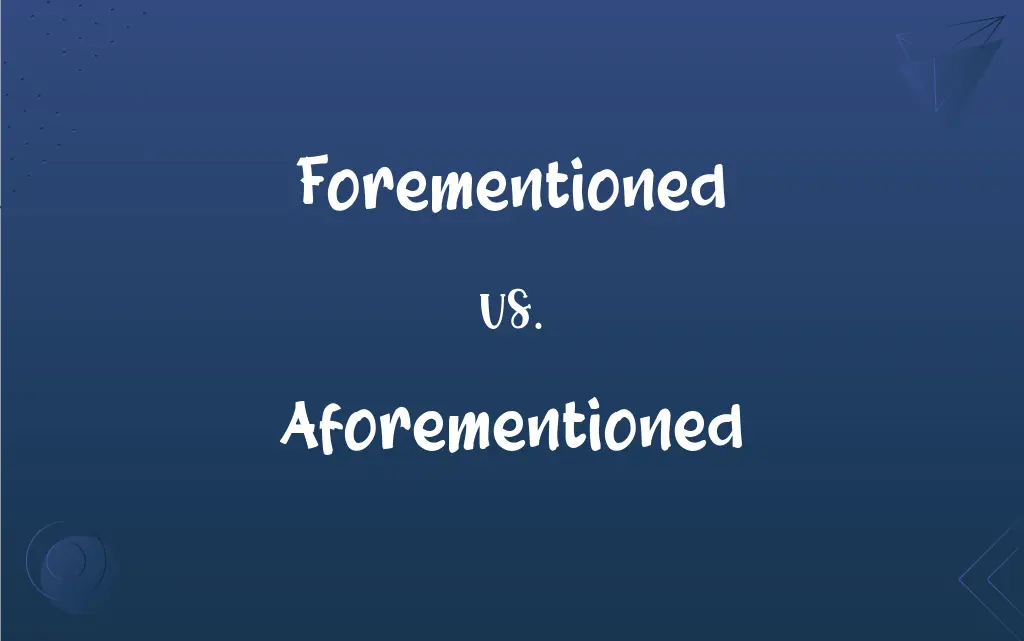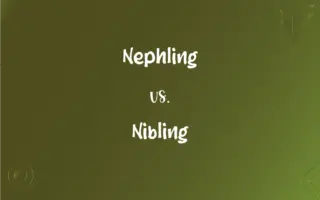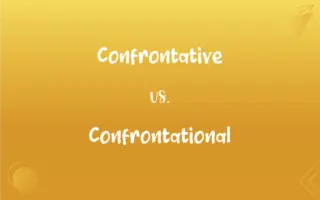Forementioned vs. Aforementioned: What's the Difference?
Edited by Aimie Carlson || By Janet White || Updated on November 30, 2023
"Forementioned" and "aforementioned" both refer to something mentioned earlier; "aforementioned" is more commonly used and formally recognized.

Key Differences
"Forementioned" is a less common variant of "aforementioned," both meaning previously mentioned or referred to. "Aforementioned" is more widely accepted and used in formal writing.
"Forementioned" might appear in casual use, while "aforementioned" is the preferred choice in academic and legal documents. This preference reflects standardization in language.
"Forementioned" could be considered archaic or less formal. In contrast, "aforementioned" is recognized in modern English dictionaries and style guides.
Both terms serve a similar purpose in referencing earlier mentioned subjects, but "aforementioned" carries a more professional tone. "Forementioned" might be seen in older texts or informal contexts.
In terms of usage, "forementioned" is often replaced by "aforementioned" in edited and proofread texts, highlighting the latter's acceptability and prevalence in contemporary English.
ADVERTISEMENT
Comparison Chart
Usage Frequency
Less common
More common
Formality
Less formal
More formal
Recognition
Less recognized in modern usage
Widely recognized and used
Preferred Context
Informal or archaic texts
Academic, legal, and formal texts
Modern Acceptance
Often considered outdated
Accepted and preferred in contemporary language
ADVERTISEMENT
Forementioned and Aforementioned Definitions
Forementioned
Used to indicate prior reference.
As per the forementioned article, the event was a success.
Aforementioned
A term for earlier mentioned subjects.
The aforementioned arguments were compelling.
Forementioned
Referring to something mentioned previously.
The forementioned theory has its merits, but it requires further study.
Aforementioned
Indicative of prior mention in text.
The policy changes will affect the aforementioned departments.
Forementioned
A less common term for earlier citation.
The forementioned examples illustrate this point clearly.
Aforementioned
Commonly used in formal and academic writing.
According to the aforementioned report, the data is conclusive.
Forementioned
An alternative to "previously mentioned."
The forementioned studies support the hypothesis.
Aforementioned
A standard term in legal documents.
The terms are outlined in the aforementioned clause.
Forementioned
Sometimes used in older or informal texts.
In the forementioned novel, the character's development is profound.
Aforementioned
Referring to something previously stated.
The aforementioned results confirm our hypothesis.
Forementioned
Alternative form of aforementioned
Aforementioned
Mentioned previously.
Forementioned
Mentioned before; already cited; aforementioned.
Aforementioned
The one or ones mentioned previously.
Aforementioned
Previously mentioned.
It wasn't until later that we realized that the aforementioned caller and this taciturn man were the same person.
Aforementioned
(uncountable) The one or ones mentioned previously.
The judge read a list of prisoners' names. She then indicated that the aforementioned were to be set free.
Aforementioned
Previously mentioned; before-mentioned.
Aforementioned
Being the one previously mentioned or spoken of;
Works of all the aforementioned authors
Said party has denied the charges
FAQs
What does "aforementioned" mean?
It refers to something mentioned earlier in the text.
Can "forementioned" be used interchangeably with "aforementioned"?
No, "forementioned" is not commonly used and might be considered incorrect.
Is "aforementioned" a formal term?
Yes, it's more formal and often used in legal, academic, or professional texts.
Can "aforementioned" be used in casual conversation?
It can be, but it's less common and might sound overly formal.
Can "aforementioned" start a sentence?
Yes, but it must refer back to something already discussed.
What's the origin of "aforementioned"?
It comes from the Middle English word "afore" (before) and "mentioned."
Is "forementioned" a real word?
It is not recognized as standard; "aforementioned" is the correct form.
Can "aforementioned" be pluralized?
No, it modifies plural or singular nouns but isn't pluralized itself.
Is there a synonym for "aforementioned"?
Yes, synonyms include "previously mentioned," "foregoing," or "above-mentioned."
How do you use "aforementioned" in a sentence?
"The aforementioned study provides detailed insights." It refers back to something previously mentioned.
What is the part of speech for "aforementioned"?
It's an adjective.
What is an example of a sentence with "aforementioned"?
"The results of the aforementioned experiment confirm our hypothesis."
Is "aforementioned" considered a jargon?
It can be seen as jargon in legal or formal contexts, not in everyday language.
Can "aforementioned" be replaced with "said" in legal documents?
Yes, "said" is another formal way to refer to something previously mentioned.
Does "forementioned" appear in dictionaries?
It's generally not found in standard dictionaries.
Are there any common mistakes with using "aforementioned"?
A common mistake is using it without having mentioned anything previously.
Is "aforementioned" commonly used in legal documents?
Yes, it's frequently used in legal contexts to refer to earlier points.
Can "aforementioned" be used in academic writing?
Yes, it's suitable for academic writing to reference previous points.
Is "forementioned" ever correct in modern English?
It's generally considered an archaic or erroneous form.
Is there a difference in meaning between "aforementioned" and "above-mentioned"?
No significant difference; both refer to something mentioned earlier in the text.
About Author
Written by
Janet WhiteJanet White has been an esteemed writer and blogger for Difference Wiki. Holding a Master's degree in Science and Medical Journalism from the prestigious Boston University, she has consistently demonstrated her expertise and passion for her field. When she's not immersed in her work, Janet relishes her time exercising, delving into a good book, and cherishing moments with friends and family.
Edited by
Aimie CarlsonAimie Carlson, holding a master's degree in English literature, is a fervent English language enthusiast. She lends her writing talents to Difference Wiki, a prominent website that specializes in comparisons, offering readers insightful analyses that both captivate and inform.































































